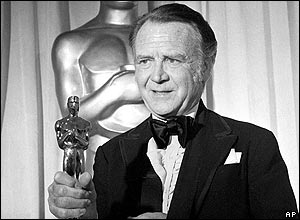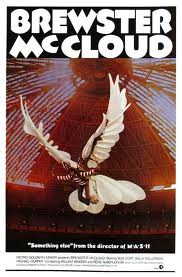Two interesting parallels exist between the Best Actor races of 1970 and 2010. First, both years' front-runners portray important WWII-era figures, whose speaking ability (or lack thereof) resulted in very different problems for each. Second, Harvard University serves as a backdrop for two of the nominees' characters: one, a story of an advantaged young man involved a special relationship to the exclusion of the outside world; and the other, the story of an advantaged young man who had thousands of "friends" but not one special person in his life.
Rounding out the top five were three heartfelt portrayals of men fighting life's battles: a championship boxer fighting for love and honor against racist attitudes; an aging father fighting for his dignity against a well-meaning son; and an alienated dropout fighting for his place in a world divided by generations and social class.

In what I consider to be Jack Nicholson's finest performance, in one of my favorite films, the confusion and alienation of youth in a time of social and political absurdity is perfectly captured by his portrayal of Robert Eroica Dupea in "Five Easy Pieces". We first meet Bobby working as a roughneck in a California oil field, living with Rayette, an uncomplicated and good-hearted waitress-girlfriend, drinking with his working-class buddies, and picking up women for dalliances in hotels. When his sister contacts him and informs him that their father is ill, he drives to Washington with Rayette, and confronts his past, where he gave up a career as a concert pianist and ran away from a life of privilege. Robert (as he is called in this section of the film), must then choose between two worlds that promise little fulfillment for him. "Five Easy Pieces" keeps unfolding in surprising ways, and Nicholson's portrayal is complete and unforgettable.
After "Easy Rider" the previous year, Jack Nicholson became an icon for young people who were struggling to break free of the stifling conformity of their parents' generation, and create a future that, as Dustin Hoffman said in "The Graduate", was "different". In the early 1970's, Nicholson's name on a film meant something relevant and important that spoke to the zeitgeist. In "Five Easy Pieces" we see many of Nicholson's signature moments: his sudden explosions of anger, his devil-may-care tenderness, his cynically arched brow, and his silent musings where the camera studies him contemplating life and all of its complexities. Nicholson provided some certified classic moments in this film: his defense of Rayette against the pompous dinner guests in his family home; his impatience during a traffic jam in which he climbs on the bed of a truck and plays a piano he finds there; and his insistence that he felt no emotion while playing Chopin for a snobbish new love interest ("it was the easiest piece I could think of"). Best of all is Nicholson's now-famous tirade in a restaurant where company rules prevent him from ordering a side of wheat toast. His slow burn and eruption of protest delighted the counterculture and eveyone else who was fed up with bureaucracy, especially in a diner. Even his confrontation with a barking dog was classic Jack in an era where he did not revert to self parody. Finally, Nicholson's monologue in front of his crippled, non-responsive father, in which Bobby lets go of years of regret, should convince audiences once and for all that his work in this edgy, difficult, and terrific film was worthy of accolades and recommendation to future generations.


Melvyn Douglas, a well-known Hollywood veteran, won his first Oscar for "Hud" in 1963. As the wise old rancher-father of Paul Newman, Douglas' character lamented the moral decay of an America embraced by his self-serving son. In 1970, Douglas played another father, this time of retired professor Gene Hackman, in "I Never Sang for my Father". Once again, Douglas portrays a man struggling against the hazards and diminishments of age, and battles a well-meaning son who has delayed his own life plans, out of guilt or loyalty, to find his father proper care. Melvyn Douglas inhabits this role as naturally as the cardigan sweater he wears. Masterfully hiding his fear of powerlessness behind a fierce roar of belligerence, Douglas shifts quickly between confusion and angry denial, and fights back out of fear of having to give up his independence. This role may cut close to home for anyone whose father can no longer take care of himself, but is outraged at any suggestion that he needs help. Hackman is a perfect foil, playing a son who has never been able to find a pathway to his father's heart, and harbors regrets of never having "sang for" him. Like "Five Easy Pieces,", this movie treats the contemporary dilemma of the generation gap, and its more personal and emotional implications. Because of Douglas' long history as a respected Hollywood performer, and his career-capping work in this film, he might have won the Oscar hands-down, except that his competition proved undeniably strong. He would wait another 9 years before capturing his second statuette for "Being There."


In 2010, the Oscar-nominated "The Social Network" tapped into popular culture and told the story of a Harvard student who could not find love among his thousands of network friends and winds up alone. Forty years earlier, Hollywood nominated a film about a Harvard student who found deep, profound love, until tragedy intervenes and he, too, winds up alone. The world changed by gigabytes, but matters of the heart remained constant. "Love Story" allowed audiences to return to simple, cathartic romance after a decade of turmoil and movies that assaulted the senses in bringing current events to the screen. Ryan O'Neal, who plays rich and eligible Oliver Barrett III, dwells in the character rather than acting it. While O'Neal may be the least strong of the five nominees in this category, in 1970 he probably made the biggest impression. The young actor was hugely popular from his recent regular role on the prime-time TV soap opera "Peyton Place". He was the right type to portray Oliver, a smart athletic pre-law student with a background drenched in wealth and protocol, but who nevertheless rejected the values and advantages his father offered him by marrying the poor Italian baker's daughter (Ali McGraw) he truly loved. Again, the Generation Gap provided diverse material for the movies. (While they would seem to have little in common stylistically, "Love Story" might be the straight-laced, traditional cousin of "Five Easy Pieces", and may be the more subversive for couching its ideology in conventional film aesthetic!)
O'Neal, like McGraw, was swept up in "Love Story" hysteria. But I would not dismiss this nomination outright. Given the role, O'Neal was a convincing Oliver, soft-spoken and headstrong, playful in the snow and devastating on hockey-skates, and we know why Jennifer would love him apart from his wealth. One might wish he could have been more expressive in the final moments, when, leaving the hospital and finding his repentant father (Ray Milland), they reconcile but part company. However, in his scenes with McGraw, O'Neal truly is believable as a guy surprised and smitten by this wise-cracking girl, enough to rebel against a stuffy and formidable family. He was still an unknown quantity to Oscar voters, and he would never get another role as influential--nor another Oscar nomination.

In 1970, George C. Scott's commanding and blustery portrayal of the title role in "Patton" was about as sure a bet as this year's odds for Colin Firth in "The King's Speech". Both have in common stories about men who changed history during World War II. And both would gain fame---or infamy--for their speeches. Scott could have claimed the prize for his opening speech alone, which has become almost a classic short-film in its own right. Based on biographies written by military historian Ladislas Farago and Patton's colleague General Omar Bradley, "Patton" was an accurate portrayal of the North African, Sicilian and European theaters of war, and the rich variety of incident during Patton's command of Third Army. While Scott's husky delivery is said to be different from Patton's actual high-pitched nasal voice, Scott forcefully recreated well-known moments from Patton's life in an unbeatable performance that was more than just a triumph of makeup and costuming. Scott was both amusing and frightening as a Commanding Officer who used profanity like an instrument and intimidated anyone who fell out of line. Scott is breathtaking in a notorious incident as he slaps a soldier in a hospital for nervous stress, and then silently prays over and kisses a badly wounded purple-heart recipient. I will never forget his sidelong glance at a Russian general as they drink a toast, or his reply when asked by a priest if he reads the Bible: "I do...every goddamn day." Also, Scott is spellbinding in a mysterious monlogue in which Patton insists that he was a reincarnated Greek leader who fought at Carthage.
Only one thing emerged as a possible obstacle to Scott receiving the award. Notorious for his distaste for pitting actors against each other in awards competitions (going back to "The Hustler" in 1961), Scott flatly refused his nomination. The Academy ruled that it was the performance, not the actor, that was eligible for the award, and the nomination stood. Would voters take offense to Scott's snub, and not mark their ballots for one of the best pieces of acting in movie history? In one of the all-time classic moments in any Academy Award broadcast, Goldie Hawn (1969's Supporting Actress winner for "Cactus Flower") opened the envelope and squealed in spontaneous surprise and glee, "Oh my god, it's George C. Scott!"









































